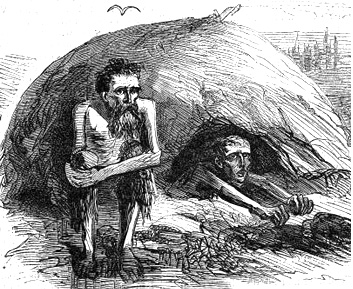
Personal and political liberation are,
of course, central themes in Whitman's early writing. In the 1855
Preface,
he uses the figure of the prisoner to suggest Liberty's opposite, the man
who needs to be freed by comradely democracy. The poet, he claims, will
win the battle, free the prisoners:
"Song
of Myself" carries out this claim with Whitman's revolutionary call
for liberating his readers -- "prisoners" of their self- and socially-imposed
limitations:
 Despite the close call of Whitman's captive brother George, however, the Civil War poems in Drum-Taps are remarkable for the complete absence in them of any commentary on the military prison experience. There are realistic poems about bravery on the field (e.g., "The artilleryman's vision,") about nursing horrendously wounded soldiers in hospitals (e.g., "The Wound-Dresser,") and about the final, bittersweet dispersing of the armies (e.g., "Return of the Heroes,") but not a one about prison experiences. It is as if Whitman's powerful imagination, which does not shrink from describing scenes of terrible physical suffering, does not want to go there-- perhaps because his poetics of freedom and open spaces made confinement seem a terrible fate. Perhaps, as well, the widely circulated accounts of the sometimes brutal treatment of prisoners by their fellow soldiers undermined his vision of the comradely love between individual men in the Army (e.g., "Vigil strange I kept on the field one night.") In the journals and "memoranda" he kept during the War, however, Whitman shows that he was quite well aware of the conditions of military prisons. He recounts the tragic tale of a Union-sympathizing Southerner, a noncombatant, who was incarcerated in Salisbury prison by the Confederates. And in the final passage of these war memoranda, he very movingly "sums up" the casualties, both moral and material of the War, closing with a description of the ruins of Andersonville Prison: "Even at Andersonville, to-day, innocence and a smile." It is perhaps significant he mentions the infamous prison last, as if it were the worst atrocity to be overcome in the healing process of the Union. One of the final poems in Drum-Taps, "Over the carnage rose prophetic a voice," suggests that only by replacing the bonds of prisons with the ties of mutual affection can this be accomplished: "these shall tie you and band you stronger than hoops of iron."  |
 Much
has been said about Whitman's direct experience of the Civil War as a volunteer
nurse in Washington hospitals [LINK: Stephanie, Jay sites]. But the trauma
of the War was direct and immediate to him in another way as well: his
brother George fought in the Union Army and, in 1864, was captured in the
fall of 1864 and shuffled between military prisons in
Much
has been said about Whitman's direct experience of the Civil War as a volunteer
nurse in Washington hospitals [LINK: Stephanie, Jay sites]. But the trauma
of the War was direct and immediate to him in another way as well: his
brother George fought in the Union Army and, in 1864, was captured in the
fall of 1864 and shuffled between military prisons in